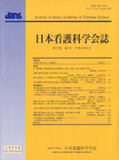Japanese
English
- 販売していません
- Abstract 文献概要
- 参考文献 Reference
- サイト内被引用 Cited by
要旨
本研究の目的は,病院で死を迎える終末期がん患者の家族の添う体験を当事者の視点から記述することにより,体験の意味を理解し,その意味を捉えたケアを検討することである.現象学的アプローチを用いて13名の研究参加者に非構造化面接を実施し,得られたデータを分析した.その結果,以下のストーリーが描き出された.
病院で死を迎える終末期がん患者の家族は,覚悟したものと現実との懸け離れた状況のギャップにうろたえながらも,改めて覚悟の時期をつくり,患者の死が訪れるという現実を見据えていた.家族は時として患者の安寧を死にさえも優先し,求めてやまなかった.その一方で,叶わないと知りながらも患者の生を願い,自分の中に同時に沸き起こる相反する願いのギャップに消耗していた.また,家族はがんに対する無力感を基盤として大きな無力を感じながらも,自分でせめてもの役割を見出していた.さらに,患者への心配は尽きることなく,家族は改めて患者のもとへ心を向けるためにも,患者のことを考えないでいられる時間を求め,必要としていた.患者に添う期間が長くなると,家族は終わりが見えず,今の状況から抜け出したいと,そっと願うようになっていた.そして,終わりが見えてきたことで安堵し,最期の時をどこかゆったりと構えていた.
以上より,こわれやすさと気丈さの相反する体験を十分考慮したケアの重要性が導き出された.
Abstract
The purpose of this study was to describe family's experiences while attending to their terminal cancer relatives who were dying in the hospital and to clarify the meaning of these experiences. Further, we considered the nursing approach. The study conducted with a phenomenological approach. Thirteen family members participated in unstructured interviews and all data were analyzed. The following results were obtained.
Family members attending to terminal cancer patients dying in the hospital tended to be confused by the gap between reality and their expectations. Despite this confusion, the family members attempted to understand the situation and prepare themselves to accept whatever occurred. They thus faced the reality of the relative's approaching death. Family members sometimes attached greater importance to the patient's well-being than to the patient's death. At the same time, the family members longed for the patients to survive, even though they knew that this was in fact impossible. The result was that the family members became exhausted by the cognitive dissonance produced by the two contradicting simultaneous desires. Although the family members felt quite helpless, primarily because they could not do anything to conquer the cancer, they found their own roles they could play. They recognized that they felt ceaseless anxiety about the patient, and they sought periods of time when they could stop thinking about the patient for a while so that their attention to the patient might be refreshed. As the period attending to the dying patients became long, they began to wish that they could get out of the current situation, which seemed to wear on endlessly. When the end actually came into sight, the family members felt relieved and appeared to accept the end in a somewhat relaxed manner.
These results suggest it is important to understand the meaning of family's experience with fragility and strength.
Copyright © 2007, Japan Academy of Nursing Science. All rights reserved.


